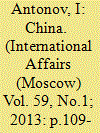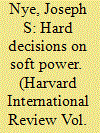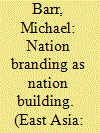| Srl | Item |
| 1 |
ID:
120557


|
|
|
|
|
| Publication |
2013.
|
| Summary/Abstract |
ON NOVEMBER 8-15, 2012, China held the 18th National Congress of the Communist Party of China (CPC) in which a process of generational change in Chinese leadership began.
This time around the preparation and the congress itself occurred in the midst of a rather complex situation. It is impossible not to recall the removal from power (at the year's start) of one of the most popular politicians, the head of the Chongqing municipal Party committee, son of famous revolutionary Bo Yibo - Bo Xilai, who aspired for one of the highest party posts. In addition, a role was played by Western media reports concerning Vice President Xi Jinping and Premier Wen Jiabao's "family riches" that are hard to make without protection from above.
|
|
|
|
|
|
|
|
|
|
|
|
|
|
|
|
| 2 |
ID:
174805


|
|
|
|
|
| Summary/Abstract |
The main aim of this article is to develop a discussion on folklorization or how identity is commodified and reduced to only some cultural traits. Currently, folklorization is one of the main devices in PRC’s cultural and political policies in Central Asia. Authors analyze folklorization both inter-state with a particular focus on Kazakhstan and Kyrgyzstan, and intra-state, with focus on Xinjiang, based on empirical data collected in these countries. The discussion provided is about China’s soft power and how it is projected to Central Asia under the administration of Xi Jinping. Moreover, it is concerned about folklorization as a political tool, utilized by the PRC government to mitigate tensions in the Xinjiang region, but also folklorized landscapes to be found also in Kyrgyzstan and Kazakhstan.
|
|
|
|
|
|
|
|
|
|
|
|
|
|
|
|
| 3 |
ID:
096167


|
|
|
| 4 |
ID:
140890


|
|
|
|
|
| Summary/Abstract |
The purpose of this study is to investigate the importance of population and language for China’s Central Asian policy through soft power resources. This article will evaluate the steps China has taken since the disintegration of the USSR to remove the perception of threat felt by the peoples of the region. We will argue that China is trying to turn its population, which is seen as the biggest threat it poses, into an advantage for itself. Moreover, it will be pointed out that China is actively using its spiritual heritage to eliminate these negative perceptions and in this regard the objectives of Confucius schools will be assessed. The study will elaborate on the fact that China is using these schools and its population as important tools in expanding its area of influence in regional and international platforms. As a result of the study, it was revealed that although the soft power of China, which is popular in academic circles and with officials, was sometimes successful in practice, there were certain limitations in its population and language policies.
|
|
|
|
|
|
|
|
|
|
|
|
|
|
|
|
| 5 |
ID:
114669


|
|
|
|
|
| Publication |
2012.
|
| Summary/Abstract |
This paper illustrates the links between China's nation building exercises
and its efforts to promote the country as a 'brand'. By using the examples of the
Shanghai Expo, China's national image films and the revival of Confucius, I show
how Chinese soft power is both inward and outward looking. Understanding this
dual role of soft power is important in comprehending the underlying motivations
behind China's attempts to create and manage its identity as orderly, prosperous and
legitimate.
|
|
|
|
|
|
|
|
|
|
|
|
|
|
|
|